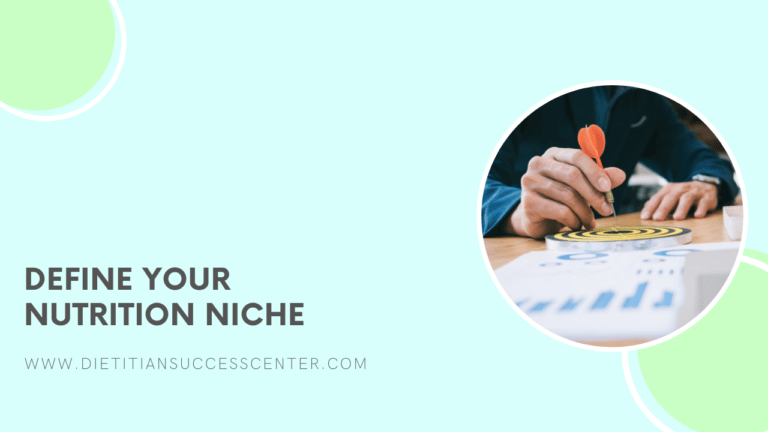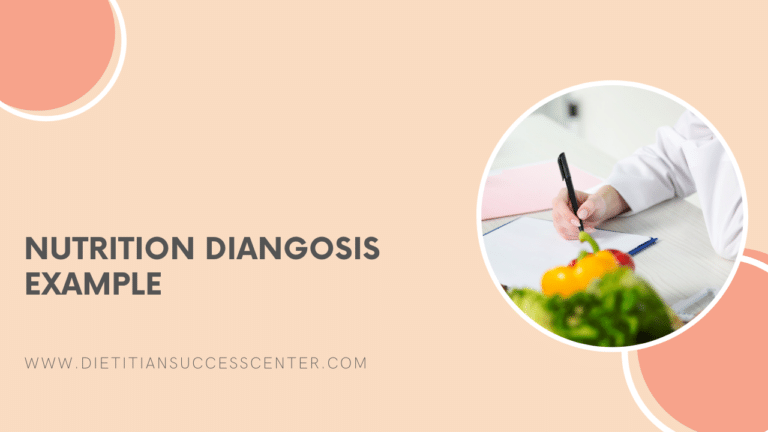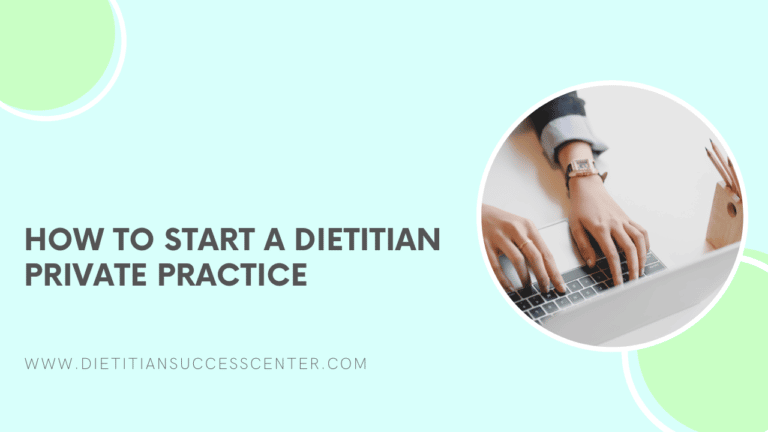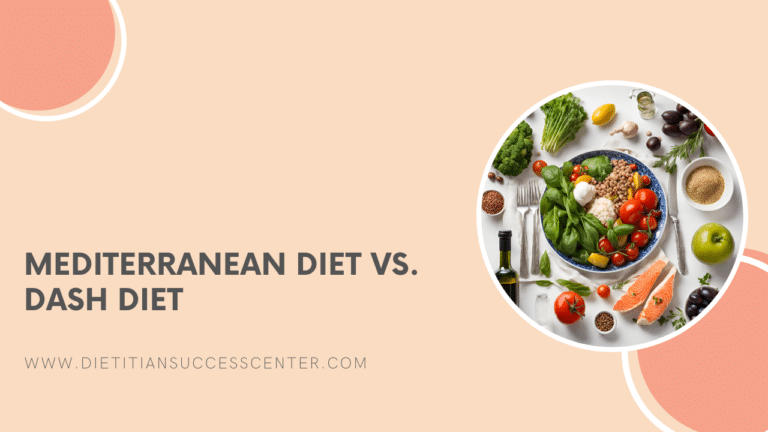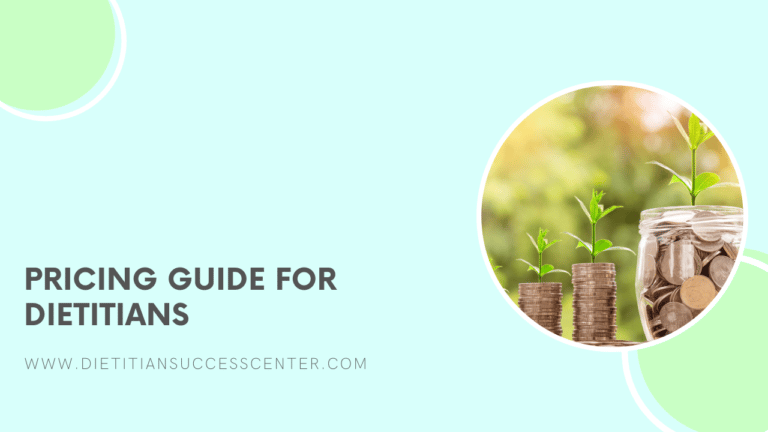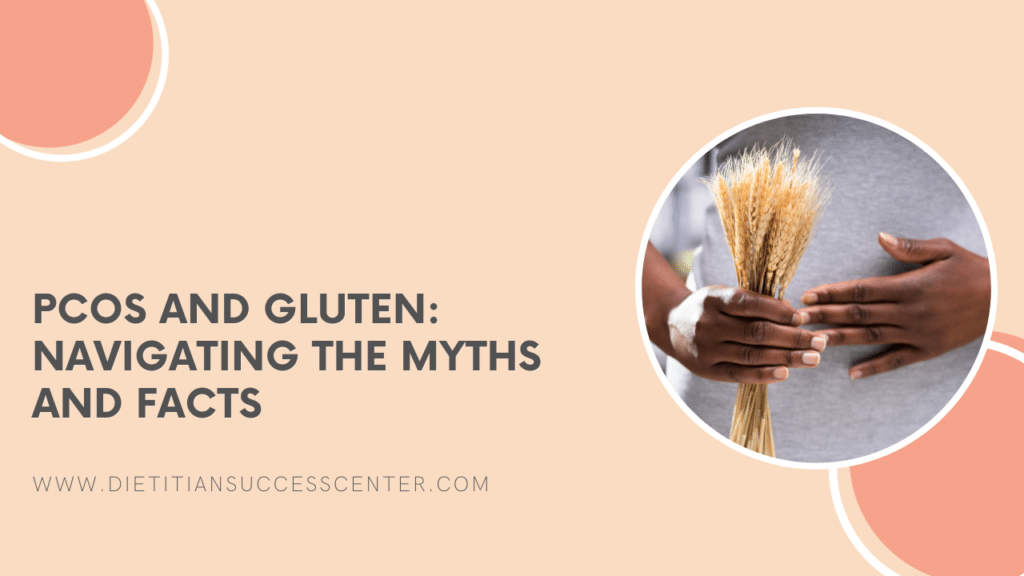
Written by Oleska Prokopovych, RD, MAN(c)
Reviewed by
Olivia Farrow, RD, MHSc
Krista Kolodziejzyk, RD, MPH, MBA
Maria Dellanina, RDN
There are various claims online about PCOS and gluten; that eating gluten-containing foods is harmful for people with polycystic ovary syndrome (PCOS). In this article, we break down the myths and research evidence related to PCOS and gluten.
Learn more about how to support your clients with PCOS and discover evidence-based nutrition therapy interventions with our comprehensive PCOS Nutrition Course, exclusively available through the Dietitian Success Center membership.
What Is PCOS?
Polycystic ovary syndrome (PCOS) is a disorder found in people with ovaries that affects the endocrine gland, which creates and secretes hormones into the bloodstream (1). PCOS is a common disorder with an estimated global prevalence of 3-10% (2). Individuals with PCOS have an increased risk of developing heart disease (2) and type 2 diabetes (2,3,4).
The condition is commonly associated with the following traits (1):
-
- A cluster of cysts (fluid-filled pockets) on the ovaries
-
- Irregular periods and subfertility (failure to conceive after 1 year of unprotected intercourse)
-
- High levels of testosterone
-
- High levels of androgens, which can cause acne, hair loss, and/or excessive hair growth on the face and body
-
- Mental health challenges (e.g. anxiety, depression, disordered eating)
The Dietitian Success Center membership includes access to many resources for dietitians. Our PCOS course includes a thorough summary of current evidence on nutrition therapy for PCOS, a 3-part video course, and client-facing handouts. To learn more about PCOS nutrition therapy, check out the DSC PCOS nutrition course.
What is Gluten?
Gluten is a protein found in wheat, rye, and barley. Gluten-containing foods should be avoided to varying degrees by those who have celiac disease, non-celiac gluten sensitivity, or a wheat allergy. Those with celiac disease must avoid gluten completely (5).
You may find that clients have read articles online reporting that eating a gluten-free diet is beneficial for PCOS management. These anecdotal sources claim that people with PCOS are more likely to have gluten sensitivity. Some articles also claim that a gluten-free diet will help with weight loss, inflammation, hormone balance, period regularity, fatigue, and more. However, current research on PCOS and gluten is highly limited, and not robust enough to make any definitive claims.
Using the most relevant research studies available, let’s bust some of the myths about PCOS and gluten.
Myths About PCOS and Gluten
MYTH: “There is a link between PCOS and gluten-related disorders.”
FACT: A 2002 study from the International Journal of Gynecology & Obstetrics concluded that PCOS did not seem to be associated with celiac disease (6). Overall, more current conclusive evidence is lacking and represents an area for future exploration.
MYTH: “A gluten-free diet will result in weight-loss.”
FACT: There is currently no data indicating that a gluten-free diet can result in planned weight or body composition change.
MYTH: “Gluten causes harmful inflammation in PCOS.”
FACT: In general, eating gluten could cause an acute inflammatory response in the body for some people (7,8). Acute inflammation is a beneficial function of a healthy body (9). It’s an immune reaction to help protect the body and can be caused by infection, but also non-infectious factors like consuming glucose, alcohol, toxins, or fatty acids (9,10). It’s likely that eating a wide variety of nutritious foods could balance out the effects of occasional “inflammatory” foods (11).
Studies are inconclusive about whether removing gluten from the diet is beneficial for reducing inflammation for someone without a gluten-related disorder (7,13,14). We also don’t know if people with PCOS are more negatively affected by gluten than others.
A Gluten-Free Diet May Cause More Harm Than Good for People With PCOS
It’s important to note that some gluten-free food products lack important nutrients, including fiber (15). Conversely, many gluten-containing products (e.g. whole-grain bread or cereal) tend to be good sources of fiber. Studies have shown that fiber can potentially reduce inflammation (16), improve insulin resistance (17), and reduce the likelihood of developing type 2 diabetes (18,19,20) and cardiovascular disease (21).
Although more research is needed on the relationship between fiber and PCOS, there is some research showing the benefits of high-fiber diets for PCOS. For example, a review article on the effect of the Mediterranean diet (which includes plenty of fiber rich foods) showed an improvement in inflammation in PCOS (22). Another article (a randomized controlled trial) evaluated the DASH diet for PCOS and found a reduction in insulin resistance (23). It should be mentioned that, along with fiber, there could be other beneficial nutrients from these diets that might explain the positive outcomes.
Unfortunately, people with PCOS may not be getting enough fiber. Two meta-analyses compared over 12 studies each and found that people with PCOS may eat less fiber than those without the condition (24,25). One of these articles suggested that not eating enough fiber could be a factor in the development of PCOS (24).
Research suggests that only those with celiac disease should be following a life-long gluten-free diet (26,27). This is because gluten causes serious damage to the gut of those with celiac disease.
When to Recommend a Gluten-Free Diet
Even though there is no clear reason to avoid gluten with PCOS, it’s still possible that clients may find symptom relief with a gluten-free diet. For example, if they have non-celiac gluten sensitivity or irritable bowel syndrome that is sensitive to certain high FODMAP foods. However, it’s important to investigate whether the client has celiac disease first through proper diagnostic measures before beginning a gluten-free diet. The diagnostic tests can show a false negative if the individual has already started eating gluten-free (28).
Even though studies on gluten and PCOS are limited, digestive issues can be common in individuals with PCOS. For this reason, practitioners should assess clients with PCOS for gluten-related disorders including celiac disease, non-gluten sensitivity, and wheat allergy.
You can learn more about celiac disease and its symptoms in DSC’s Celiac Disease video course and toolkit. Also, check out the printable client handouts on gluten-free eating to feel more confident in supporting a gluten-free diet if indicated for your patient or client.
Key Takeaways
-
- More research is needed on the topic of PCOS and gluten.
-
- One study suggested there is no connection between PCOS and celiac disease.
-
- The inflammatory effects of gluten can likely be balanced out by eating a variety of foods including those with anti-inflammatory qualities. It’s unknown if people with PCOS have a different reaction to gluten than the general population.
-
- People with PCOS (and those following a gluten-free diet) might not be eating enough fiber. Yet, some studies have shown that fiber can help reduce inflammation, improve insulin resistance, and reduce the likelihood of developing type 2 diabetes, and cardiovascular disease, which are all aspects of PCOS.
-
- Clients with PCOS should be assessed for celiac disease before beginning a gluten-free diet.
-
- Learn about nutrition therapy interventions with more evidence to support those with PCOS in DSC’s PCOS Nutrition Course.
You might also enjoy reading:
Dietitian Success Center is THE professional development resource for dietitians and dietetic students. Our mission is to make it easier for dietitians and dietetic students to build expertise. We do this through evidence-based online nutrition courses, community and ready-to-use client handouts. Plus – we give you the tools to start and grow your dietitian private practice!
References
- Huddleston, Heather, and Anuja Dokras. “Diagnosis and Treatment of Polycystic Ovary Syndrome.” JAMA, vol. 327, no. 3, Jan. 2022, pp. 274-5, https://doi.org/10.1001/jama.2021.23769.
- Wekker, V, et al. “Long-term cardiometabolic disease risk in women with PCOS: a systematic review and meta-analysis.” Human Reproduction Update, vol. 26, no. 6, Nov.-Dec. 2020, pp. 942-60, https://doi.org/10.1093/humupd/dmaa029.
- Cioana, Milena, et al. “Prevalence of Polycystic Ovary Syndrome in Patients With Pediatric Type 2 Diabetes: A Systematic Review and Meta-analysis.” JAMA Network Open, vol. 5, no. 2, Feb. 2022, pp. e2147454, https://doi.org/10.1001/jamanetworkopen.2021.47454.
- Long, Caiyi, et al. “Prevalence of polycystic ovary syndrome in patients with type 2 diabetes: A systematic review and meta-analysis.” Front. Endocrinol., vol. 13, Aug. 2022, pp. 1-11, https://doi.org/10.3389/fendo.2022.980405.
- Biesiekierski, Jessica. “What is gluten?” Journal of Gastroenterology and Hepatology, vol. 32, no. S1, Feb. 2017, pp. 78-81, https://doi.org/10.1111/jgh.13703.
- Kuscu, NK, et al. “Celiac disease and polycystic ovary syndrome.” International Journal of Gynecology & Obstetrics, vol. 79, no. 2, Oct. 2002, pp. 149-50, https://doi-org.subzero.lib.uoguelph.ca/10.1016/S0020-7292(02)00241-2.
- Bruzzese, V, et al. “Efficacy of gluten-free diet in patients with rheumatoid arthritis.” Reumatismo, vol. 72, no. 4, 2020, pp. 213-7, https://doi.org/10.4081/reumatismo.2020.1296.
- Hollon, Justin, et al. “Effect of gliadin on permeability of intestinal biopsy explants from celiac disease patients and patients with non-celiac gluten sensitivity.” Nutrients, vol. 7, no. 3, Feb. 2015, pp. 1565-76, https://doi.org/10.3390/nu7031565.
- Hannoodee, Sally, and Dian Nasuruddin. “Acute Inflammatory Response.” National Library of Medicine, 14 Nov. 2022, https://www.ncbi.nlm.nih.gov/books/NBK556083/.
- Chen, Linlin, et al. “Inflammatory responses and inflammation-associated diseases in organs.” Oncotarget, vol. 9, no. 6, Jan. 2018, pp. 7204-18, https://doi.org/10.18632/oncotarget.23208.
- Minihane, Anne, et al. “Low-grade inflammation, diet composition and health: current research evidence and its translation.” The British journal of nutrition, vol. 114, no. 7, Oct. 2015, pp. 999-1012, https://doi.org/10.1017/S0007114515002093.
- Fritsche, Kevin L. “The science of fatty acids and inflammation.” Advances in nutrition, vol. 6, no. 3, May 2015, pp. 293S-301S, https://doi.org/10.3945/an.114.006940.
- Haines, ML, et al. “Systematic review: the evidence base for long-term management of coeliac disease.” Alimentary Pharmacology and Therapeutics, vol. 28, no. 9, Oct. 2008, pp. 1042-66, https://doi.org/10.1111/j.1365-2036.2008.03820.x.
- Karakula-Juchnowicz, Hanna, et al. “The study evaluating the effect of probiotic supplementation on the mental status, inflammation, and intestinal barrier in major depressive disorder patients using gluten-free or gluten-containing diet (SANGUT study): a 12-week, randomized, double-blind, and placebo-controlled clinical study protocol.” Nutrition journal, vol. 18, no. 1, Aug. 2019, pp. 50, https://doi.org/10.1186/s12937-019-0475-x.
- Melini, Valentina, et al. “Gluten-Free Diet: Gaps and Needs for a Healthier Diet.” Nutrients, vol. 11, no. 1, Jan. 2019, pp. 170, https://doi.org/10.3390/nu11010170.
- Liu, Ting, et al. “Effect of dietary fiber on gut barrier function, gut microbiota, short-chain fatty acids, inflammation, and clinical outcomes in critically ill patients: A systematic review and meta-analysis.” J Parenter Enteral Nutr, vol. 46, no. 5, Dec. 2021, pp. 997-1010, https://doi-org.subzero.lib.uoguelph.ca/10.1002/jpen.2319.
- Shang, Yujie, et al. “Effect of Diet on Insulin Resistance in Polycystic Ovary Syndrome.” The Journal of Clinical Endocrinology & Metabolism, vol. 105, no. 10, Oct. 2020, pp. 3346–60, https://doi.org/10.1210/clinem/dgaa425.
- Marsh, Kate, and Jennie Brand-Miller. “The Optimal Diet for Women with Polycystic Ovary Syndrome?” British Journal of Nutrition, vol. 94, no. 2, Mar. 2007, pp. 154-65, https://doi.org/10.1079/BJN20051475.
- Yao, Baodong, et al. “Dietary fiber intake and risk of type 2 diabetes: a dose–response analysis of prospective studies.” Eur J Epidemiol, vol. 29, Jan. 2014, pp. 79-88, https://doi-org.subzero.lib.uoguelph.ca/10.1007/s10654-013-9876-x.
- Aune, Dagfinn, et al. “Whole grain and refined grain consumption and the risk of type 2 diabetes: a systematic review and dose–response meta-analysis of cohort studies.” Eur J Epidemiol, vol. 28, Oct. 2013, pp. 845-58, https://doi-org.subzero.lib.uoguelph.ca/10.1007/s10654-013-9852-5.
- Hajishafiee, Maryam, et al. “Cereal Fibre Intake and Risk of Mortality from All Causes, CVD, Cancer and Inflammatory Diseases: a Systematic Review and Meta-Analysis of Prospective Cohort Studies.” British Journal of Nutrition, vol. 116, no. 2, May 2016, pp. 343-52, https://doi.org/10.1017/S0007114516001938.
- Çıtar Dazıroğlu, Merve, and Nilüfer Acar Tek. “The Effect on Inflammation of Adherence to the Mediterranean Diet in Polycystic Ovary Syndrome.” Curr Nutr Rep, vol. 12, Jan. 2023, pp. 191-202, https://doi-org.subzero.lib.uoguelph.ca/10.1007/s13668-023-00451-6.
- Foroozanfard, Fatemeh, et al. “The effects of dietary approaches to stop hypertension diet on weight loss, anti-Müllerian hormone and metabolic profiles in women with polycystic ovary syndrome: A randomized clinical trial.” Clin Endocrinol, vol. 87, no. 1, Mar. 2017, pp. 51-8, https://doi-org.subzero.lib.uoguelph.ca/10.1111/cen.13333.
- Leung, Wing Ting, et al. “Lower Fiber Consumption in Women with Polycystic Ovary Syndrome: A Meta-Analysis of Observational Studies.” Nutrients, vol. 14, no. 24, Dec. 2022, pp. 5285, https://doi.org/10.3390/nu14245285.
- Kazemi, Maryam, et al. “Comparison of dietary and physical activity behaviors in women with and without polycystic ovary syndrome: a systematic review and meta-analysis of 39 471 women.” Human Reproduction Update, vol. 28, no. 6, Nov.-Dec. 2022, pp. 910-55, https://doi.org/10.1093/humupd/dmac023.
- Cabanillas, Beatriz. “Gluten-related disorders: Celiac disease, wheat allergy, and nonceliac gluten sensitivity.” Critical Reviews in Food Science and Nutrition, vol. 60, no. 15, Aug. 2019, pp. 2606-21, https://doi.org/10.1080/10408398.2019.1651689.
- Pietzak, Michelle, and John A. Kerner Jr. “Celiac Disease, Wheat Allergy, and Gluten Sensitivity.” Journal of Parenteral and Enteral Nutrition, vol. 36, no. 1S, Jan, 2012, pp. 68S-75S, https://doi-org.subzero.lib.uoguelph.ca/10.1177/0148607111426276.
- Kelly, Ciaran, et al. “Advances in Diagnosis and Management of Celiac Disease.” Gastroenterology, vol. 148, no. 6, May 2015, pp. 1175-86, https://doi.org/10.1053/j.gastro.2015.01.044.


